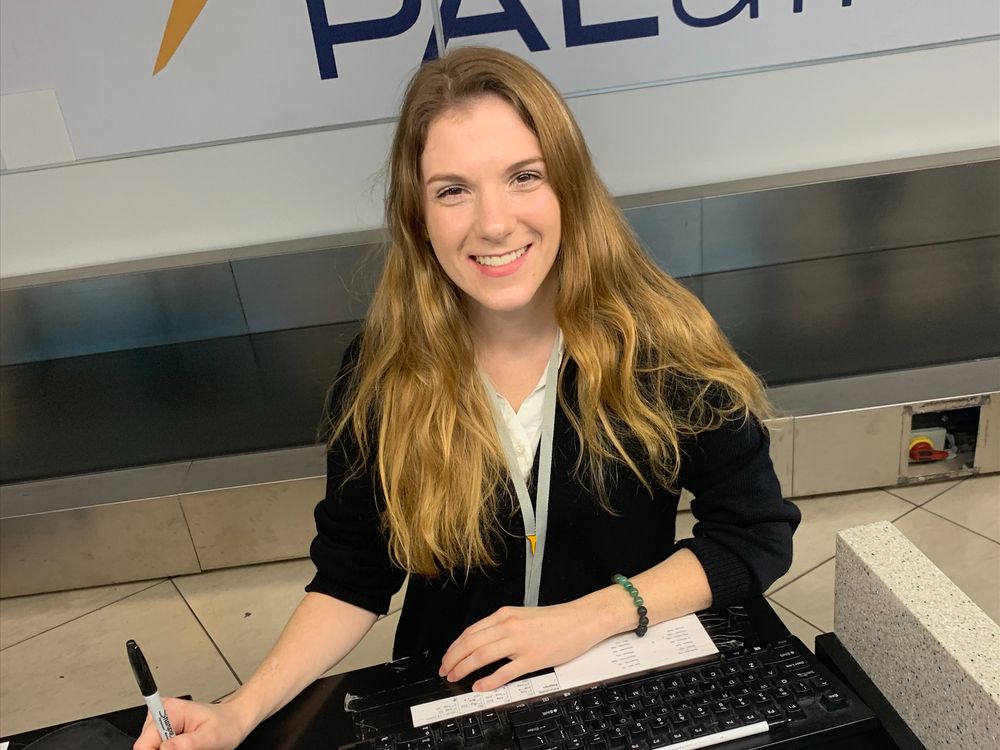Province home to growing, highly literate Ukrainian refugee community keen to work and grateful to be somewhere safe

Article content
Iryna Zozulia is 28, a Virgo, delightfully chatty and well-suited to her job as a customer service representative working the check-in counter at St. John’s International Airport for PAL Airlines, a regional carrier headquartered in Newfoundland and Labrador’s capital city.
Advertisement 2
Article content
She is full of questions for travellers, who, generally being Newfoundlanders, typically aren’t shy about asking a few questions of their own, including, due to her accent, where she is from. Thus ensues a “guessing game,” as they pick somewhere in Europe — often France and Germany — or Montreal.
Article content
The search builds until she reveals, with beaming pride, she is a Ukrainian refugee and building a new life for herself and her son in a place she knew nothing about, beyond it being “cold” and far away, prior to her arrival in St. John’s in May.
Article content
“It is so much better here than I could even have imagined,” Zozulia said, a few hours before a weekday afternoon shift at the airport. “PAL even sent me to work in Wabush, and I saw the northern lights. It was amazing — the world stopped spinning — and I made a wish in that moment to bring my son here, and now he has been here with me for over a month.”
Advertisement 3
Article content
It has been almost nine months since Russia invaded Ukraine, displacing millions of Ukrainians, more than 100,000 of whom have since come to Canada as refugees. That number is likely to grow, since nearly 700,000 Ukrainians have applied for Canadian visas, which continue to be processed as the war grinds on.
From the outset, stories of gun battles in what were once quiet Kyiv suburbs, videos of apartment blocks being targeted by missile strikes, evidence of war crimes and pictures of citizens with bags and young children cradled in either arm making a run for the Polish border walloped hearts on this side of the Atlantic.
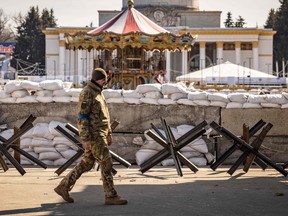
Canadians wanted to help, but the conversation in St. John’s went from what could be done to actually doing emergency airlifts. The province is now home to a growing, highly literate, pop-up Ukrainian refugee community, some 1,200-plus and counting, drawn from a broad cross section of backgrounds — from engineers and IT wizards to doctors and truckers, and all things in between — who are keen to work and grateful to be somewhere safe.
Advertisement 4
Article content
“The Ukrainians have brought tens of millions of dollars’ worth of education, talents and skills with them,” Gerry Byrne, Newfoundland and Labrador’s Minister of Immigration, Population Growth and Skills, said. “They are already enriching our province.”
PAL, for one, now has 18 Ukrainians on the payroll. There are a couple of experienced pilots going through the process of being licensed to fly in Canada, as well as accountants, ground crew, finance professionals and flight operators.

Jake Trainor, the airline’s chief executive and a former Canadian army helicopter pilot, is eager to hire more, and not just for their skills, but because of their drive to make the opportunity count.
“These people are great ambassadors for the company,” he said. “They become extremely loyal, engaged employees, and that further builds on a culture of family, care and success, which is what we want to be known for as an organization. It is infectious.”
Advertisement 5
Article content
PAL, an airline with a reputation for flying into rugged, remote communities, and CanAid Logistics Ltd., a boots-on-the-ground service provider in humanitarian hotspots, were keen to get involved when the province opened a Ukrainian Family Support Desk in Warsaw in March — the only province to do so — to recruit refugees interested in coming to a place most had never heard of.
Trainor and the province got talking, a plane was sourced and on May 9, the initial Poland-to-St. John’s, provincially sponsored airlift touched down with 166 Ukrainians on board, including a certain chatty Virgo.
Zozulia was working as a pre-departure translator in Warsaw when a PAL staffer recognized her go-getter mentality and offered her a job in St. John’s. There have been two subsequent airlifts, with a fourth planned in early December, and no plans, according to Byrne, of discontinuing a program with a $7-million budget.
Advertisement 6
Article content
“What we know to be true is that more creates more,” he said. “And when you create a successful community, within the larger community, that successful community is going to want to stay, and it grows.”
What began as a humanitarian initiative has become a human resources windfall for the province and its business community, which struggles to attract and retain skilled workers, even those born and raised there.
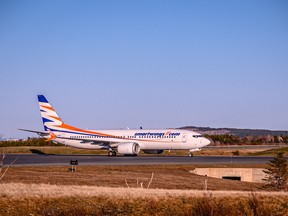
PAL isn’t the only organization tapping into the Ukrainian talent pool. Fort Amherst Healthcare operates three assisted-care living facilities across the province, with two in St. John’s. COVID-19 exacerbated a pre-existing labour shortage in the care sector, but then along came the refugees.
The company now has five Ukrainians on staff — namely, a nurse, medical student, radiologist, apprentice cook and dietary aide — and has just completed another bulk hire that will boost the Ukrainian headcount to 11 total.
Advertisement 7
Article content
“In some cases, the Ukrainian Canadians are bringing medical knowledge to the table, and we certainly understand that we are benefiting from that,” Loralee Wettlaufer, a general manager at one of Fort Amherst’s St. John’s facilities, said.
Her hope is that the refugees successfully jump through whatever retraining and licensing hoops are required to make maximum use of their skills in Canada, whether it is for her company or a nearby hospital, where the health-care worker shortage is equally acute.
The tech sector, construction and building trades, large retail and wholesale outlets, shipping companies, hipster barbershops, restaurants, hotels and boutique inns have also all benefited from the influx of Ukrainians.
Advertisement 8
Article content
But there is another side to the refugee story. Being from away, when away has been torn apart by war, isn’t easy. The refugees are trying to look forward. The reality is that it’s impossible not to look back.

For example, Oleh and Anastasiia Sysa and their boys, Danny and David, moved into a new house on the outskirts of Kyiv in June 2021. Both worked for a commercial airline — Oleh as a captain, Anastasiia in management. They were solidly “middle class,” planned for purchases, big and small, dreamed of family trips and loved watching their children, aged 11 and seven, grow.
“It is very difficult talking about the future, because a year ago we had plans,” Anastasiia said. “Now I am sure every single Ukrainian is living, like us, with today’s day, because you know you have this day, and you need to take care of those next to you, because you don’t know what tomorrow will be.”
Advertisement 9
Article content
Underlying the Ukrainian diaspora in Newfoundland and Labrador is a knowledge of life as it was changing overnight. It is a painful memory, coloured with hastily packed bags, abandoned homes and the loss of security. March was pure chaos for the Sysas. Poland was overrun with refugees. Starting over in St. John’s is a happier subject, but that’s not to say it isn’t difficult.
“All we were thinking about was where we could be safe, and Canada represented a safe haven,” Oleh said.
We are lucky, so far away from home, in the middle of the ocean, and we are still able to do what we love
Anastasiia Sysa
On the great Canadian map of places to hang one’s hat, Newfoundland and Labrador wasn’t the obvious choice for the family, although it quickly emerged as such after they did some research.
They sent an email to the province’s Ukrainian family support desk. They heard back within two days from a Warsaw-based program development officer. They immediately felt supported. Wanted. Their questions were answered, decisions were made and, like 700 of their compatriots, they flew to St. John’s in July, not via the airlifts, but by paying their own way.
Advertisement 10
Article content
Getting hired by PAL was the unforeseen bonus.
“When we got the job offer — both of us — it was the happiest day of our lives,” Anastasiia said. “We are lucky, so far away from home, in the middle of the ocean, and we are still able to do what we love.”
The family rented a furnished house near the airport and bought a 15-year-old white Mercedes to drive around in. “No rust,” Oleh said. The colours of the Ukrainian flag adorn a curtain covering the glass patio doors.
Work colleagues have given them bags of clothes and took the boys trick-or-treating on Halloween. Neighbours have unexpectedly appeared carrying plates of cod; friends are looking to get them a deal on snow tires; the family was given tickets to a Newfoundland Growlers hockey game a recent Friday night.
Advertisement 11
Article content
“This game made such a great impression on everyone,” Oleh said. “Danny said he wants to play hockey now.”
The Sysas feel an obligation to pay Canada back. Their sense of gratitude is palpable. And if Canada is their future — long term — Oleh said St. John’s is the place they will be, but the family can’t commit quite yet. Zozulia, however, is unequivocal: St. John’s is now home.
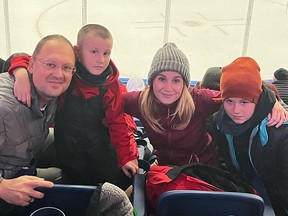
“I am already in the process of doing a visa for my mom, because I need somebody to help me out with my son,” she said.
Newfoundland and Labrador has made a bet on the newcomers, but the payoff remains uncertain. They are here now, but will they stay?
About a quarter of the new arrivals have yet to find work, according to the province. The challenges include language, culture and made-in-Canada red tape, sometimes all three knotted together in a headache-inducing mess.
Advertisement 12
Article content
Oleh Sysa once flew Airbus 320/321 series passenger jets for a carrier servicing routes throughout Europe. Now he works on solid ground doing quality assurance work, while going through a pilot relicensing process he imagined would be quick, but isn’t.
Ukrainian physicians face similar challenges in a province where almost a quarter of its 522,875 residents don’t have a family doctor, according to the Canadian Medical Association.
On top of the licensing puzzle is the language barrier. It is a difficulty Constanza Safatle, the Chilean-born executive director of TaskForce NL, a non-profit that connects employers with immigrant candidates, can speak to firsthand.
In a past life, she was a commercial lawyer at a Chilean bank. She moved to St. John’s in 2016 with her husband, who was enrolled in graduate school. Saying her name was the extent of her English language skills.
Advertisement 13
Article content
She signed up for English classes only to discover, she now says in clear, Spanish-accented English, that the curriculum was more concerned with teaching things such as “Halloween and Christmas,” and other wholesomely Canadian whatsits, than the nuts and bolts of writing a resumé and interviewing for a job.
Safatle did eventually find work as a barista — coffee shops being ideal places to hone one’s language chops — although it quietly drove her nuts when customers commented upon her “cute” accent.
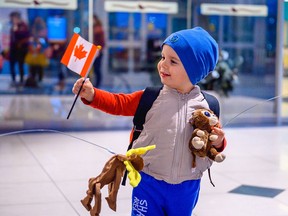
She now runs her own clothing company, on top of her executive directorship role at the non-profit, and helps organize job fairs to put Ukrainians together with prospective employers in a targeted fashion.
Among her recommendations to employers is to include intensive, non-Christmas-related English classes as part of any employment package. It is an upfront investment, with a substantial potential payback.
Advertisement 14
Article content
“If you are hiring an immigrant with a huge background that isn’t recognized here, hire them based on experience, and if you include language classes in the hiring, you’ll wind up hiring a person who, within three months, is going to have enough English to work and validate their skills, and the company is going to benefit,” she said.
If people are going to stick around, they need to be able to pay the bills. Newfoundlanders are welcoming and friendly folks by reputation, and that helps, but more is needed.
Iryna Zozulia works at the airline full time and pays $750 a month in rent for a one-plus-bedroom apartment not far from her son’s new school. Her colleagues outfitted Amir with a new backpack and supplies before his first day. They also offer to babysit, carpool to work and do pretty much anything they can to support the single mom from the other side of the world.
Advertisement 15
Article content
-

Booster Juice founder goes from corner office to frontlines of Ukrainian refugee crisis
-

‘Legendary’ Ukrainian resourcefulness inspires Canadian vodka CEO into action
-

Ethereum co-founder’s pro-Ukraine stance makes his Russian-Canadian dad proud
-

Chasing cold cash: How icebergs became the field of dreams for believers and schemers
Before the Russian invasion, Zozulia was happily chipping away for a supply chain logistics multinational in Lviv. She had studied English at school and had been to the United States as part of a student work and travel abroad program.
Her general knowledge of St. John’s prior to arriving in May is best summarized by its proximity to the ocean (close) and a preconceived notion of the weather (cold). But it wasn’t cold last summer when some new Canadian friends took her out for a night on the town.
Advertisement 16
Article content
She was officially “screeched-in,” at Christian’s Pub, a local ritual she had heard people speak of, but had trouble imagining beforehand, since it involves drinking a shot of nasty-tasting liquor and kissing a fish.
“What was this fish?” she wondered.
The other cod-smooching pub goers were tourists from the usual places: Toronto, the U.S. and England. The bar erupted in applause when they heard Zozulia was Ukrainian.
Now it is November in the city by the ocean, and the cold, once faraway place is starting to feel like home.
“I am an official Newfoundlander now,” Zozulia said. “I know I am going to stay here and build a new life for me and my son.”
• Email: joconnor@nationalpost.com | Twitter: oconnorwrites

